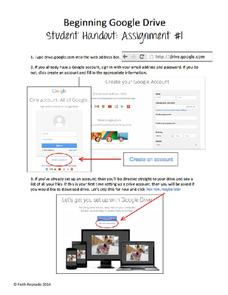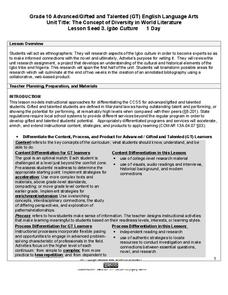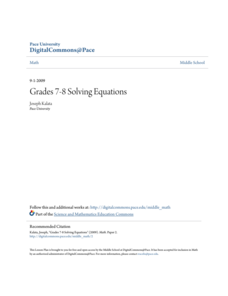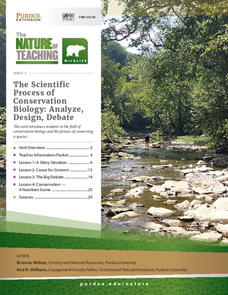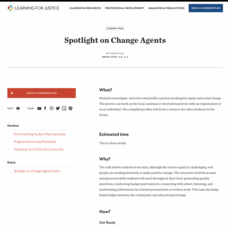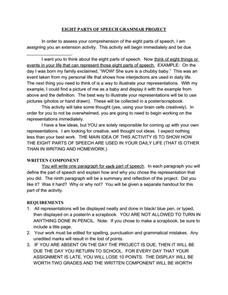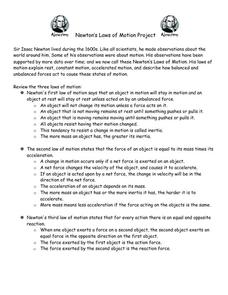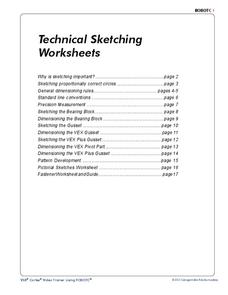Curated OER
Beginning Google Drive
Lead your class through creating and sharing documents with Google Drive with a step-by-step activity. The document illustrates each step with screenshots and includes clear and effective instructions that prompt active engagement....
National Gallery of Canada
Urban Scenes
Select a theme together to guide and inspire works of art. Class members view images of art and discuss the images of cities. After choosing a theme, individuals create posters that reflect and contribute to the theme. They can use paint...
Maryland Department of Education
The Concept of Diversity in World Literature Lesson 3: Igbo Culture
What cultural concepts must readers understand in order to connect to Things Fall Apart? As part of their study of Chinua Achebe’s novel, class members research Nigeria and the Igbo culture to create a collaborative, web-based, annotated...
Code.org
Encoding and Sending Formatted Text
Introduce your class to encoding text. Pairs work together to create a protocol to send text prior to learning ASCII encoding. Groups then collaborate to send and translate ASCII codes creating a formatted text message.
Beyond Benign
pH Neutral
Acids and bases combine to create our most popular shampoos—who knew?! Using the eighth lesson in a 24-part series, your classes study how acids and bases combine to create safe mixtures such as those in your scholars' shampoos. They...
Pace University
Grades 7-8 Solving Equations
Create a similar blueprint. The differentiated lesson has pupils work in teams to create a brochure, scale model, or blueprint of a selected house with some minor changes. Once finished, team members present their final projects to the...
Purdue University
The Scientific Process of Conservation Biology: Analyze, Design, Debate
Scientists use data to learn about species survival—and your classes can too! A set of four lessons guides learners through a process to draw conclusions about the fluctuations in the population of the Hellbender species. They read...
Radford University
Koi Pond
There's nothing fishy about the activity. Future mathematicians design a koi pond from various three-dimensional shapes. They calculate the perimeter, area, and volume of the pond, and then create PowerPoint presentations. They also...
Teaching Tolerance
Spotlight on Change Agents
A thought-provoking resource guides learners as they interview agents of social change and share their findings. Scholars select an individual, create questions, conduct the interview, and create a profile of the person they selected....
EngageNY
Reading for Fluency: Readers Theater about the Rainforest (Page 33)
Lights, camera, action. Scholars use page 33 of The Most Beautiful
Roof in the World to create a readers theater. They work in triads and use sticky notes to mark and create their own speaking parts from sections of the text. They then...
Health Smart Virginia
The Do Over
Middle schoolers are offered an opportunity to use what they have learned about effective communication in a "Do-over." First, they create a storyboard of an argument they had with a friend or family member that wasn't productive. Then,...
Workforce Solutions
Workforce Solutions 2-3 Lessons
Four lessons and an at-home connection examine 12 jobs. Beginning with an interactive map, scholars view and discuss each one within their small group. Groups focus on the products provided and on their scarcity. Finally, pupils look...
Bonneville
Wind Power: A Hands on Experience
Turn a learning experience into a fun lesson. Future engineers create blades for a wind turbine using card stock. Using a fan, they test how well the blades help the wind turbine turn. The goal is to build blades that are effective...
Baylor College
HIV/AIDS in the United States
In the final of five lessons about HIV/AIDS, groups create presentations to share data about the infection rates in the United States, examining demographic and geographic trends over the past ten years. Depending on how much time you...
Independence Middle School
Eight Parts of Speech Grammar Project
Young grammarians demonstrate their understanding of the eight parts of speech by creating a scrapbook that uses personal stories and photos to illustrate each term. After defining a term, individuals relate and illustrate a personal...
Berkshire Museum
Camouflage!: Collecting Data and Concealing Color
Help young scholars see the important role camouflage plays in the survival of animals with a fun science lesson. Starting with an outdoor activity, children take on the role of hungry birds as they search for worms represented by...
Sharp School
Newton’s Laws of Motion Project
After a review of all three of Newton's laws, physical scientists complete a choice project. They can create a book in which they collect pictures where the laws of motion are depicted, produce a PowerPoint presentation, or produce a...
Schools United to Provide Enhanced Resources Network
AP English Project: Journal of Literary Terms and Devices
To prepare for the AP English exams, individuals are asked to create a notebook of literary terms and devices. The terms must be defined, accompanied by representative artwork, and illustrated by an example drawn for a named source. A...
National Gallery of Canada
Reading Symbols
Introduce your upper-elementary students to printmaking. Class members view prints, select and research symbols in a piece, and create their own sets of prints using styrofoam trays. Pupils can wash off the paint on their trays to make...
National Gallery of Canada
My World
Art can tell viewers about an artist's personality and background. Have your learners look at Inuit art and consider subject matter and how it relates to the artist and his or her world. The related art project requires pupils to create...
National Gallery of Canada
To Canada with Love
Focus on line and color with a postcard project. Learners view various works of art and discuss line and color before moving on to creating their own work. Using nature as inspiration, pupils decorate postcards and mail them after...
Novelinks
The Color of Water: Family History Assignment
To conclude their study of James McBride's The Color of Water, class members create their own memoir, focusing on a family member who help shape their life.
EngageNY
Mid-Module Assessment Task - Geometry (Module 2)
Challenge: create an assessment that features higher level thinking from beginning to end. A ready-made test assesses knowledge of dilations using performance tasks. Every question requires a developed written response.
Carnegie Mellon University
Technical Sketching Worksheets
How do you create a technical drawing? Cover the basics of technical sketching with a few practice sketches of simple shapes. A technical sketching lesson introduces the proper precision measurement techniques. Pupils progress to draw...


